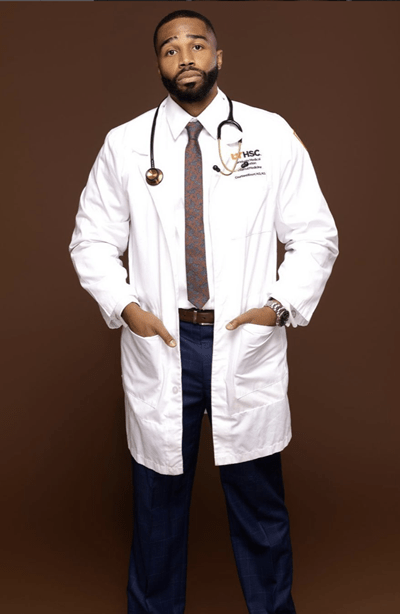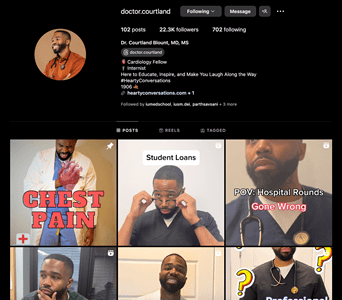Success and empowerment can only be found where support is plentiful.
Courtland Blount, MD, MS, strongly believes that – so much so that he’s set out to build a multifaceted support system, serving those near and far. Whether it’s online among his followers on Instagram, where he regularly shares videos about health and wellness. Or alongside his colleagues and friends at Indiana University School of Medicine, as they work to uplift more aspiring – often first-generation and underrepresented – young doctors. Or within his own clinical office, where he takes the extra time, listens a little longer and explains a little more, all to ensure his patients feel properly understood and cared for.
Blount, a third-year cardiovascular disease fellow, founded Hearty Conversations, a multimedia networking organization with the two-prong mission of educating the public on cardiovascular health and helping future physicians navigate medical education.
Blount regularly shares videos on Instagram that touch on these topics, and his more than 22,000 followers are made up of patients and students alike.

Often the videos are humorous, but Blount’s videos also show a more impactful tone – like the video he called “Clinic Personalities,” illustrating a cultural connection between physician and patients, or his livestream clip of him giving the keynote presentation at a Regional Medical Education Conference.
During this speech, he shed light to some of America’s overlooked history on why many African Americans still have a deep-seeded skepticism towards the health care field and how we still have so much work to do in establishing a more prominent minority presence within the field in medicine.
He hopes that, through his content creating, speech giving and connection making, he’s helping people feel less lonely. He knows these systems – both health care and medical education – can be daunting.
Facing them is only made worse if you think you’re alone, he said.
“I can’t help people escape long nights at the library; I can’t help them escape missing a friend's wedding or time with their family. But I can I keep people from feeling isolated,” he said.
In a way, the idea for Hearty Conversations came from Blount’s reflecting on his own moments of loneliness.
Growing up, Blount had an aptitude for science and a strong desire to help others.
He’d watch as people from his Memphis neighborhood became sick from a variety of diseases and disorders. It left him feeling curious about health and wanting to learn more about medicine.
His ambition to become a doctor solidified when his own grandmother fell ill and died while in the hospital. When he looks back on that time, he often wonders if he and his family would have been better equipped to help her if they’d understood more of what her doctors were discussing.
Blount attended Vanderbilt University after high school and then earned his medical degree from the University of Louisville School of Medicine. He returned to Memphis to complete residency at the University of Tennessee Health Sciences Center before joining IU School of Medicine as a cardiology fellow.
As a first-generation doctor, he didn’t have family members with the perspectives to help him weigh his options. And with Black men and women making up less than 6% of practicing doctors and only 10% of medical students, according to the Association of American Medical Colleges, any advice he received from his peers or mentors came from people who likely didn’t share his background and experiences.
Now, Blount wants to fill that void for others. He sees Hearty Conversations as an online resource for both patients and doctors and as a place where advocacy and learning can mesh. He takes great pride in the knowledge that he could be helping someone, states away, whom he may never meet.
And he wants to see Hearty Conversations grow offline as well, reaching more medical schools and college campuses.
Already, he’s partnered with colleagues at IU School of Medicine to host panel discussions and mixers, hoping to instill a feeling of community among young Black medical professionals in Indianapolis.
The school, he said, has been supportive and encouraging of these efforts.
IU’s providers, faculty members and learners know that culturally competent, patient-centered care is the foundation of providing excellent health care, eliminating health disparities, and contributing to innovative breakthroughs in science, and the school is dedicated to creating an environment that fosters inclusion.
And Blount is grateful the school has made those commitments.
“Students need institutions that advocate for diversity,” Blount said. “You can be in a classroom of 100 people but still feel lonely if the people around you look nothing like you.”
June 2024 Update: For his advocacy and mentorship efforts, Dr. Courtland Blount was named to the Black Health Connect 40 Under 40 Class of 2024, honoring exemplary individuals committed to promoting diversity and equity in health care.
